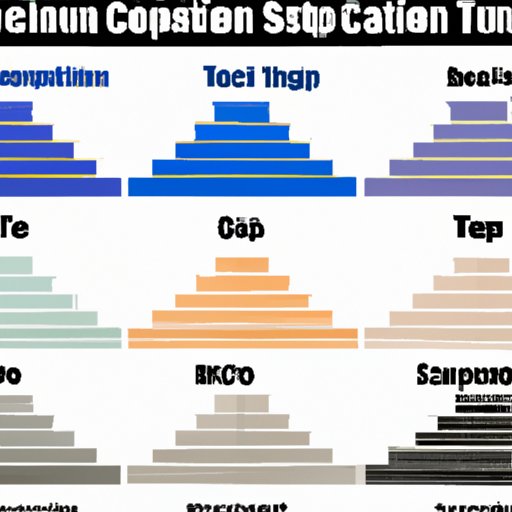Introduction
A compiler is a program that translates human-readable source code into machine-readable object code. It is an essential element of the modern software development process, allowing developers to create efficient and reliable programs. In this article, we will explore how compilers work, the different types of compilers, and the role they play in software development.

Breakdown of the Steps Involved in Compilation
The compilation process consists of several distinct steps: lexical analysis, syntax analysis, semantic analysis, code generation, and optimization. Each of these steps is necessary for successful compilation.
Lexical Analysis
The first step in the compilation process is lexical analysis. This involves breaking down the source code into its individual components, such as keywords, identifiers, constants, and operators. These components are then organized into a data structure called a symbol table.
Syntax Analysis
The next step is syntax analysis. This involves checking the source code for any errors in the grammar or syntax. If any errors are found, the compilation process will be halted and the error will be reported to the user.
Semantic Analysis
The third step is semantic analysis. This involves analyzing the source code to ensure that it is semantically correct. This includes checking for any conflicts between variables or functions, as well as ensuring that all functions have the correct parameters.
Code Generation
After the source code has been analyzed, the compiler will generate the object code. This is the machine-readable code that can be executed by the computer. The object code generated by the compiler is usually written in assembly language.
Optimization
Finally, the compiler will optimize the object code. This involves making the code more efficient by removing any unnecessary instructions or optimizing the order of instructions. Optimization is an important step in the compilation process, as it can significantly improve the speed and performance of the resulting program.
Exploring the Different Types of Compilers
There are several different types of compilers available. Each type of compiler has its own unique set of features and capabilities, so it is important to select the right one for your project.
Interpreters
An interpreter is a type of compiler that reads and executes source code line by line. This makes it ideal for debugging and testing, as it allows the programmer to make changes to the code without having to recompile the entire program.
Just-in-Time Compilers
A just-in-time (JIT) compiler is a type of compiler that compiles code at runtime. This allows for faster execution of code, as the code does not need to be compiled ahead of time. JIT compilers are often used in Java virtual machines.
Ahead-of-Time Compilers
An ahead-of-time (AOT) compiler is a type of compiler that compiles code before it is executed. This allows for faster execution of code, as the code does not need to be compiled at runtime. AOT compilers are often used in native mobile applications.

A Technical Overview of the Compiler Process
To understand how compilers work, it is helpful to examine the technical details of the compilation process. Here, we will explore each step in detail.
Lexical Analysis
The first step in the compilation process is lexical analysis. This involves breaking down the source code into its individual components, such as keywords, identifiers, constants, and operators. These components are then organized into a data structure called a symbol table.
Syntax Analysis
The next step is syntax analysis. This involves checking the source code for any errors in the grammar or syntax. If any errors are found, the compilation process will be halted and the error will be reported to the user.
Semantic Analysis
The third step is semantic analysis. This involves analyzing the source code to ensure that it is semantically correct. This includes checking for any conflicts between variables or functions, as well as ensuring that all functions have the correct parameters.
Code Generation
After the source code has been analyzed, the compiler will generate the object code. This is the machine-readable code that can be executed by the computer. The object code generated by the compiler is usually written in assembly language.
Optimization
Finally, the compiler will optimize the object code. This involves making the code more efficient by removing any unnecessary instructions or optimizing the order of instructions. Optimization is an important step in the compilation process, as it can significantly improve the speed and performance of the resulting program.
Examining the Role of a Compiler in Software Development
Compilers play an important role in software development. They provide an abstraction layer between the source code and the machine code, allowing developers to write code in high-level languages that can be easily understood by humans. Compilers also allow for more efficient code execution by optimizing the code for the target platform. Finally, compilers help to detect and prevent errors by checking the code for any syntax or semantic errors.

Understanding the Benefits of Using a Compiler
Using a compiler offers several advantages. Compilers can help to improve the performance of a program by optimizing the code for the target platform. Additionally, using a compiler can help to increase security by preventing malicious code from being executed. Finally, compilers can make debugging easier by providing detailed error messages when errors are encountered.
Conclusion
Compilers are an essential part of the software development process. They allow developers to create efficient and reliable programs by translating high-level source code into machine-readable object code. Compilers also offer several advantages, such as improved performance, increased security, and easier debugging. By understanding how compilers work and the different types of compilers available, developers can make informed decisions about which compiler to use for their projects.
(Note: Is this article not meeting your expectations? Do you have knowledge or insights to share? Unlock new opportunities and expand your reach by joining our authors team. Click Registration to join us and share your expertise with our readers.)
